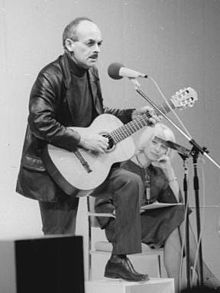Bulat Okudzhava
| Bulat Okudzhava | |
|---|---|

Okudzhava performing at Palace of the Republic, Berlin, Germany, 1976
|
|
| Background information | |
| Birth name | Bulat Shalvovich Okudzhava |
| Born | May 9, 1924 Moscow, Soviet Union |
| Origin | Soviet Union |
| Died | June 12, 1997 (aged 73) Paris, France |
| Genres | Author song |
| Occupation(s) | Musician, poet, editor, novelist, short story writer |
| Instruments | Vocals, guitar |
| Years active | 1950s–1997 |
| Associated acts | Bards |
Bulat Shalvovich Okudzhava (Russian: Була́т Ша́лвович Окуджа́ва; Georgian: ბულატ ოკუჯავა) (May 9, 1924 – June 12, 1997) was a Soviet poet, writer, musician, novelist, and singer-songwriter of Georgian-Armenian ancestry. He was one of the founders of the Soviet genre called "author song" (авторская песня, avtorskaya pesnya), or "guitar song", and the author of about 200 songs, set to his own poetry. His songs are a mixture of Russian poetic and folksong traditions and the French chansonnier style represented by such contemporaries of Okudzhava as Georges Brassens. Though his songs were never overtly political (in contrast to those of some of his fellow Soviet bards), the freshness and independence of Okudzhava's artistic voice presented a subtle challenge to Soviet cultural authorities, who were thus hesitant for many years to give official recognition to Okudzhava.
Bulat Okudzhava was born in Moscow on May 9, 1924 into a family of communists who had come from Tbilisi, the capital of Georgia, to study and to work for the Communist Party. The son of a Georgian father, Shalva Okudzhava, and an Armenian mother, Ashkhen Nalbandyan, Bulat Okudzhava spoke and wrote only in Russian. Okudzava's mother was the niece of a well-known Armenian poet, Vahan Terian. His father served as a political commissar during the Civil War and as a high-ranking Communist Party member under the protection of Sergo Ordzhonikidze later on. His uncle Vladimir Okudzhava was an anarchist and a terrorist who left The Russian Empire after a failed attempt to assassinate the Kutaisi governor. He was listed among the passengers of the infamous sealed train that delivered Vladimir Lenin, Grigory Zinoviev and other revolutionary leaders from Switzerland to Russia in 1917.
...
Wikipedia
